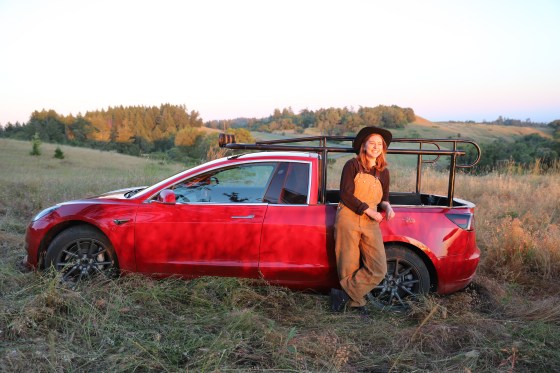Mitchell Yow’s pickup truck has decals advertising that the vehicle is all-electric, but sometimes people aren’t convinced. “That’s not really electric, is it?” bystanders will ask, often approaching him in grocery store parking lots in Surprise, Arizona, where Yow and his company Torque Trends, which makes gearboxes for converting gasoline vehicles to electric, swapped out the hulking Ford F-150’s V8 engine for an electric motor. The result doesn’t look like any zero-emissions vehicle most people have seen. “Even though they see it, and they read it, they don’t believe it,” says Yow. “They’ve never heard of an electric truck.”
That’s likely about to change. As automakers’ investments in electric vehicles (EVs) ramp up, pickup trucks are fast becoming a new front in the electrification wars. Manufacturers from Tesla to Ford are unveiling electric pickups—just last week, General Motors said it will deliver a 400-mile-range electric Chevrolet Silverado—though they have yet to hit the market. For automakers, the potential rewards are huge, as pickups accounted for one in five new cars sold in the U.S. in 2020. Environmental gains could be big, too. When it comes to typical highway or city driving, pickups are disproportionately wasteful; even the newest models have dismal fuel economy ratings. Getting pickup drivers to switch to more efficient options is essential if the U.S. is to decarbonize its economy, and electric pickups could also help automakers reach fleetwide fuel efficiency targets.
But for now, the possibility of mass conversion to electric pickups seems tenuous at best. Most EV buyers so far have been wealthy coastal dwellers, while pickup buyers tend to live in different areas of the country, often with different values and needs. “We’ve been thinking about it for a long time,” says Autotrader analyst Michelle Krebs. “We’re always saying internally, ‘Do you think anybody really wants an EV pickup truck?'”

For one thing, there might not be a huge overlap between people currently interested in EVs and those who buy pickups. Historically, EV adoption has been the highest in liberal-leaning coastal states, especially California and Washington. States where pickups rule the roads, like Texas, Wyoming, and North Dakota, tend toward big skies and conservative values. On an individual basis, survey data have shown EV and hybrid buyers tend to lean Democratic, while pickup drivers lean Republican. One Oct. 2020 Strategic Vision survey showed that more than 50% of heavy-duty pickup buyers identify as Republicans, while less than 10% say they are Democrats. Meanwhile, Democrats bought 36% of midsize hybrids and EVs, compared to less than 20% bought by Republicans. Electric pickups’ potential is further limited by the fact that many states with high numbers of pickup drivers tend to have the worst EV charging infrastructure.
There’s also a deeper issue with some of the upcoming vehicles themselves. Auto industry analysts say that many of the new electric pickup trucks set to hit the market, like the Tesla Cybertruck, the Rivian R1T, and GM Hummer EV, appear to be aimed more at wealthy “lifestyle” buyers (coders who go rock climbing on the weekends, for instance) than “traditional” pickup truck buyers (who are more likely to use them for, say, pulling equipment around a farm or hauling building materials). That might mean that, in the near term, electric pickups might cut into sales of luxury EVs like the Tesla Model S rather than reduce demand for internal-combustion pickups.
“There is a bit of cannibalization within the [EV] segment; people will shift to whatever the cool thing is to have at the time, sadly,” says Jessica Caldwell, executive director of insights at Edmunds. “You may not necessarily be getting a lot of new buyers.”
But at least some longtime pickup owners are looking to switch. Matt Gehrisch, a 43-year-old information security consultant from northern-central Ohio—and a proud owner of a 2004 Chevy pickup—is excited about the upcoming EV options. “They’re going to have the kind of torque and performance that a diesel has, but without the diesel maintenance costs,” he says. “It’s gonna be really cool.” With no major EV pickups on the market, it remains to be seen how many drivers are similarly excited to switch. For now, it’s rare to find someone carting around building materials on electric power—though some are so impatient for zero-emissions pickups that they’re taking matters into their own hands. Simone Giertz, a YouTuber and inventor, went to the trouble of cutting up a Tesla Model 3 to make her own handicraft electric pickup. “I use her everyday, but she’s not waterproof, the trim is a little bit off, and the tailgate doesn’t work,” Giertz says. “She’s a little bit annoying to drive because it’s like waving a giant flag of ‘Look at me.'”

Automakers like Ford—maker of the F-150, the best-selling pickup in the U.S.—believe other pickup fans are ready to go electric, too; it’s making a big bet on an electric F-150 expected out in 2022. “[Pickup drivers] have to rely on these products for their businesses and the tasks they’re doing, and so they’re very cautious about adopting a new technology, unless they know it is reliable,” says Ford Electric Vehicles general manager Darren Palmer. “They are naturally more cautious, because they need to rely on [their trucks] so much, but they are more open to it than we might have imagined.”
Pickup drivers have adapted to changes before. Some were skeptical, for instance, when Ford released an F-150 with a lighter, mainly aluminum body and smaller engine in 2014, but the change didn’t put a dent in sales. Ford’s new hybrid F-150 Powerboost, meanwhile, has been a hit. In the long run, converting pickup drivers to electric—and getting low-economy older models off the roads—may be less a matter of lifestyle branding or flashy styling than of offering reliable, cost-effective vehicles capable of meeting pickup drivers’ needs. “At the end of the day, I don’t need all the luxury,” says Gehrisch. “I just need a good, solid, reliable truck.”

0 Comments